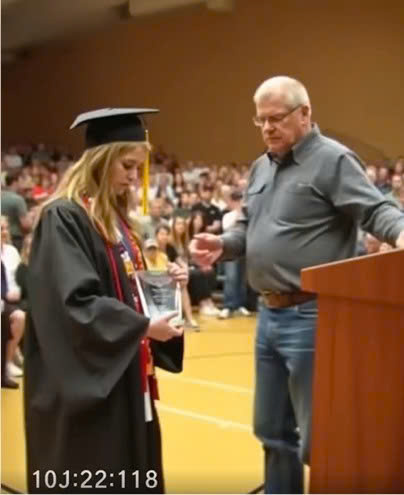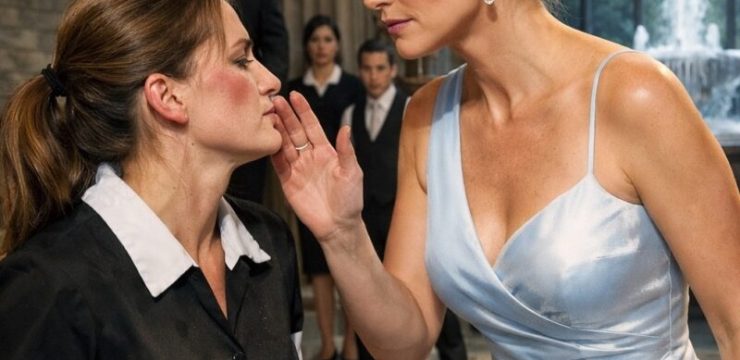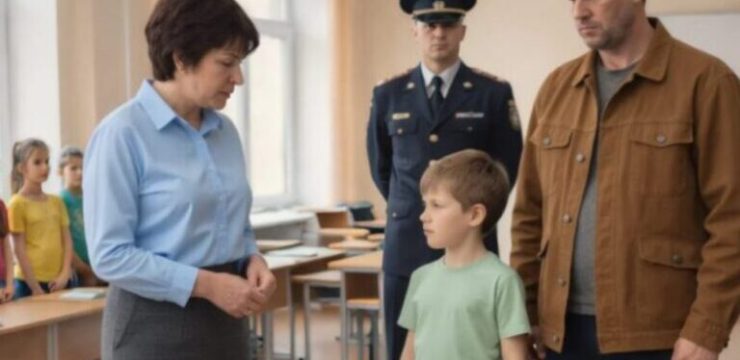Graduation was supposed to be a moment of triumph, a night when years of late nights, early mornings, and countless hours of study finally meant something. I imagined walking through the front door with my cap and gown folded neatly in my bag, my medal safe inside, and maybe—just maybe—catching a glimpse of pride in my father’s eyes. But that was not how the evening unfolded. Instead of celebration, I came home to a kitchen thick with tension. My father’s eyes were clouded with something I couldn’t quite name, and the silence between us was far heavier than the broken glass that later littered the hallway.

He sat across from me at the kitchen table, his posture stiff, his gaze distant. When he finally spoke, his voice was so soft I almost missed it. “This… this isn’t what you should be working for,” he whispered. Frustration lingered in his tone, but behind it I caught something else—fear, regret, maybe even guilt. I wanted to argue, to make him see my achievements for what they were. I wanted him to acknowledge the years of effort, the sacrifices, the long nights spent pushing myself harder than I thought possible. I wanted him to be proud of me. But when I opened my mouth, the words refused to come out. Instead, I sat in silence, staring at him from across the table, the distance between us stretching like an unbridgeable canyon.
That silence had been living in our home for years, long before this night. It arrived the day my mother passed away and never left. It lingered in every room, in every unasked question, in every avoided conversation. I remembered sneaking in late at night, careful not to disturb him, fully aware he would never ask where I had been or how I was coping. It was easier to live alongside the silence than to break it, but in moments like this, the weight of it felt almost unbearable.
“You know,” I said carefully, testing the fragile air between us, “I didn’t do all this just for me. Mom always said—” But before I could finish, his eyes flashed, and his voice cut like a blade. “Don’t. Don’t bring her into this.”
I froze, but then I pushed forward, unwilling to let the truth remain unspoken. “But she believed in me,” I whispered, steady despite the lump in my throat. “She wanted this. For me. For you to want this for me, too.”
That was when something shifted. For the first time in years, he really looked at me. Not just a glance, not just a passing acknowledgment, but a deep, searching look that revealed the man he used to be. I saw the grief that had hollowed him out, the love he once had for my mother, the pain of losing her. He wasn’t just angry—he was broken. His voice cracked when he finally admitted, “I’m trying, Sophie. But it’s hard.”
Those words startled me. They were not an excuse but a confession, raw and trembling. They pierced through the wall I had built to protect myself. In that moment, I realized something I had long overlooked: while a shattered trophy could be replaced, the years of silence and unspoken pain between us could not. The damage wasn’t about the object broken on the floor—it was about the bond that had been fractured long before.
“I know it’s hard,” I said gently, though my voice carried determination. “But I’m not giving up on us. I want us to talk. Can we at least try?”
For a moment, he said nothing. His jaw tightened, his eyes softened, and then, slowly, he nodded. “Yeah,” he said, almost reluctantly. “Maybe we can. It’ll take time, though.” His words weren’t a promise, but they were the closest thing we had to a beginning.
Later that night, I walked down the hallway and saw the pieces of my graduation trophy scattered across the floor, glittering faintly in the dim light. I crouched down and began picking them up one by one. The edges were sharp, pressing into my palms as I gathered them, but I held the fragments carefully. To anyone else, it was just a broken object. To me, it was a symbol of something greater. Like the trophy, my relationship with my father was cracked, imperfect, and scarred. But also like the trophy, it was not beyond repair.
I placed the pieces gently on my dresser, arranging them into something that vaguely resembled what they had once been. They reminded me of the pain of the evening, but also of the fragile hope that had sparked at the kitchen table. For the first time in a long time, I felt the faintest possibility that healing was within reach—not just for me, but for us.
In the quiet of my room, I made a promise to myself. I would not measure success by medals, applause, or even by trophies, no matter how shiny or whole they appeared. True success, I realized, was found in the courage to face what had been broken and to keep fighting for what mattered most. It was about the people who stood beside you, even when the bond was strained, and the willingness to mend relationships, even when the cracks ran deep.
That night changed me. It wasn’t the kind of moment I could post about or celebrate with photos. It was private, raw, and complicated. But it was real. My father and I still had miles to go, but the silence that had once seemed permanent had finally been broken. His words—“I’m trying, but it’s hard”—became the thread of possibility that maybe, just maybe, we could weave something stronger together.
The trophy could remain broken. That no longer mattered. What mattered was that for the first time in years, we had begun to pick up the pieces—not just of glass, but of us.





